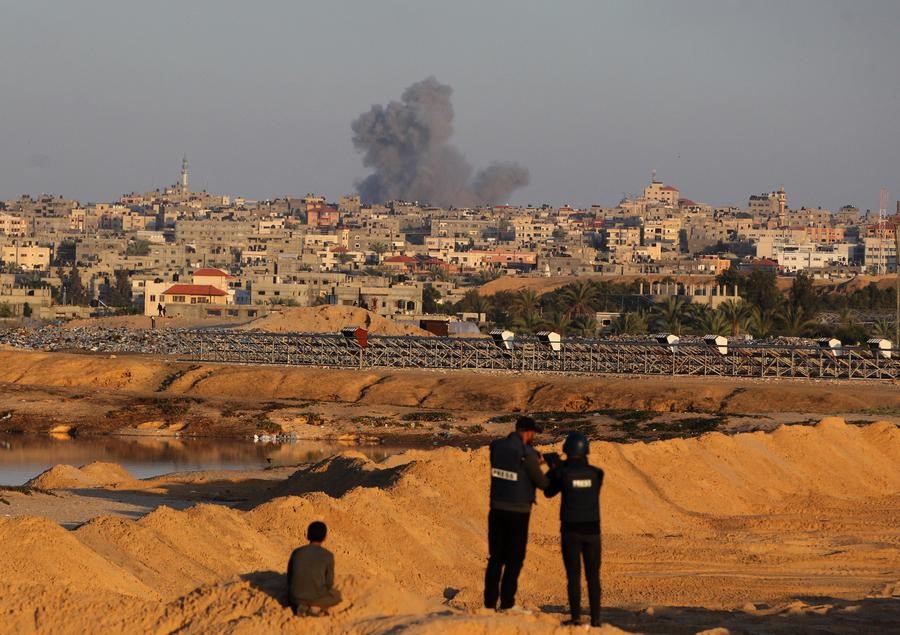Algeria called an urgent UN Security Council meeting on Tuesday after an Israeli strike killed 45 people at a tent camp in Rafah for displaced people on Sunday…reports Asian Lite News
The United States is wary of a new UN resolution on the war in Gaza, its deputy ambassador said Wednesday, as a draft seeks an immediate ceasefire and a halt to Israel’s offensive in Rafah.
Algeria called an urgent UN Security Council meeting on Tuesday after an Israeli strike killed 45 people at a tent camp in Rafah for displaced people on Sunday, drawing international condemnation.
“We’ve said from the beginning that any kind of additional product on the situation right now probably is not going to be helpful,” deputy US envoy Robert Wood told reporters, referring to a text from the council.
“It’s not going to change the situation on the ground.”
Algeria started circulating its draft among fellow members of the Security Council after the emergency meeting.
The draft resolution, which draws on last week’s ruling by the International Court of Justice (ICJ), “decides that Israel, the occupying Power, shall immediately halt its military offensive, and any other action in Rafah.”
It also “demands an immediate ceasefire respected by all parties, and also demands the immediate and unconditional release of all hostages.”
No vote on the text has been scheduled yet.
“We don’t think another resolution is really going to change the dynamics on the ground,” said Wood.
Wood said the United States, which freely uses its veto power in the Security Council to protect Israel, believes that negotiations in the region are the proper way to achieve a ceasefire.
In Washington, White House national security spokesman John Kirby said the Algerian text is imbalanced and fails to note that “Hamas is to blame for this conflict.”
Gaza-based Hamas leader Yahya Sinwar could end the fighting right away if he agreed to a ceasefire and hostage release deal, said Kirby.
In early May indirect talks between Israel and Hamas failed to achieve a ceasefire and a hostage and prisoner release deal. Qatar, Egypt and the United States acted as intermediaries.
In a meeting on Wednesday, many members of the Security Council noted the ICJ ruling last week ordering Israel to halt its offensive in Rafah immediately.
“This council should speak out urgently on the situation in Rafah and call for an end to this offensive,” French Ambassador Nicolas de Riviere said.
The ambassador from Guyana, Carolyn Rodrigues-Birkett, said her country felt helpless “in the face of the dehumanization of a people, disregard for the rule of law and impunity.”
“When will it end? Who can make it end?” she asked.
“And yet, we cannot afford to remain silent, as too many have already been tragically silenced, forever, in this war,” said Rodrigues-Birkett.
The council has struggled to find a unified voice since the war broke out with the October 7 Hamas attack on Israel, followed by Israel’s retaliatory campaign.
The Hamas attack resulted in the deaths of 1,189 people, mostly civilians, according to a tally based on Israeli official figures.
Militants also took 252 hostages, 121 of whom remain in Gaza, including 37 the army says are dead.
Israel’s retaliatory offensive has killed at least 36,171 people in Gaza, mostly civilians, according to the Hamas-run territory’s health ministry.
After passing two resolutions centered on the need for humanitarian aid to people in Gaza, in March the Security Council passed a resolution calling for an immediate ceasefire — an appeal that had been blocked several times before by the United States, Israel’s main ally.
Washington, increasingly frustrated with how Israel is waging the war and its mounting civilian death toll, allowed that resolution to pass by abstaining from voting.
Israeli military takes full control of Gaza-Egypt border
The Israel Defence Forces said on Wednesday it was in full “operational control” of the entire Gaza-Egypt border and has so far located 20 tunnels leading into the Egyptian Sinai.
The 14 km strip of land along the border is known as the Philadelphi corridor, a buffer zone created to prevent weapons smuggling in 2006 after Israel disengaged from the Strip. But in 2007, Hamas violently seized control of Gaza from the Palestinian Authority.
The army said troops were physically present in most of the corridor, except for a portion of near the Mediterranean coast which is controlled by surveillance and firepower.
The army said it was aware of the presence of some of the cross-border tunnels. Another 82 shafts within the corridor area that did not cross the border were also discovered and will be destroyed.
The IDF reportedly found dozens of rocket launchers placed by Hamas along the border, a politically sensitive area. The border is technically a demilitarized zone under the terms of the Camp David Accords signed in 1978.
Israel took control of the Palestinian side of the Rafah border crossing with Egypt and most of the border on May 7.
ALSO READ-Israel takes control of key Gaza-Egypt border road

Leave a Reply